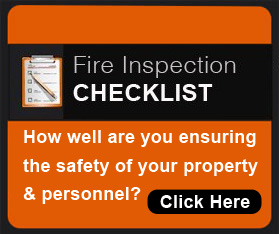In our last post, inspired by a survey of business owners in the UK, we looked at the four main reasons small businesses and property owners take fire safety risks: confusion, lack of resources, apathy, and denial. Now it’s time to talk about solutions.

Exploring Solutions
1) Have your local fire department do a walk-through and assessment of your building/business.
If you’ve never done this, there is no time like the present. You may be able to get this done at no cost to you, but a potential drawback is that your areas of noncompliance will be on record. If you do this, be prepared to take actions to address any problem areas. You could also have an independent fire safety professional provide you with a safety assessment. Fire safety professionals often have a history of working for the local fire departments, so you can expect the same level of expertise with a trusted provider.
Tip: Be sure to clarify the least-expensive path to compliance. For example, if you have an old building that needs to be brought up to code, must you knock out that wall and install a new doorway/fire escape, or could you simply replace the immovable iron bars on the window (at much lower cost)?
2) Conduct your own fire safety audit.
Legal obligations aside, if you work somewhere, if you rent a space, if you own a space, whatever it may be ─ sometimes you just need to step up. I recently read a blog post on keeping tenants safe in rental properties (published by Concentric Lettings, a rental agency in the UK). Their staff conducted fire risk assessments in their own homes to help train to do this for the apartments they were renting. They recognized that many of the landlords they worked with were failing to do so on their own, despite a legal obligation. They were shocked by what they discovered; as the author indicated, “most of [their staff] initially felt the need to move!”
Although they faced some real fire safety challenges in their own homes, they were able to implement appropriate fire safety solutions (apparently even as tenants) to correct the situation. This agency went the extra mile to worry about what danger they might be putting their tenants in as rental agents, they took ownership of the problem, and didn’t wait for someone else to solve it. Now they are able to –at minimum– educate their renters about fire safety considerations for their rental properties, which is the responsible thing to do.
Though legal responsibility lies with specific parties, many more are actually impacted by fire safety measures. The bottom line is that someone has to be proactive and move towards fire safety and compliance. If not you, then who? (Perfect segue to my next solution….)
3) Consider outsourcing.
If you don’t want the hassle of worrying about the latest changes to code and trying to figure out whether your equipment works and if you are taking all the necessary steps to prove you are in compliance, you need a fire safety professional. The “catch” of this is that you do have to realize fire safety is an ongoing commitment. Fire safety and compliance require periodic ongoing maintenance and testing. That is per the Fire Code.
As fire safety professionals, we can make compliance very simple for you, and do it with little disruption to your business. You can find a reputable provider who you can trust (find out what to look for here), automate your reminders for periodic fire-safety tasks, have your provider address those recurring items, and schedule inspections at times that are least-intrusive to your business. That’s as easy as it gets!
4) Lobby for increased public funding of fire safety upgrades.
Though a larger scale solution, and unlikely to yield near-term benefit (even if successful), this could take some of the burden off of small business owners and support greater fire-safety compliance. Funding has been allocated for similar projects in the past (in the early 90’s through the Rupert Pilot Project, mentioned here) and it has also resurfaced for discussion with the new sprinkler requirements (though it’s so far been denied). It’s fair to say this is probably a questionable pursuit at a time when Toronto’s fire services are being cut ...
The Takeaway:
Yes, it's likely that it will cost you something to get your business into compliance with fire-safety code. But, if you really think about it, doesn't noncompliance actually cost more?
Recent high-profile fire disasters in the Greater Toronto Area:
- Landlords and business owners facing substantial fines - and even jail time -for fire safety violations. (Examples: Hamilton landlord,Multiple offenders in Barrie).
- Business and property owners facing substantial loss of property and business disruption due to fire. (Examples: Barrie apartment fire, Hornings Mills business fire, Windsor bumper plant fire, Gatineau recycling plant fire, Havelock restaurant fire).
- Injury, death, and property damage where lack of working fire alarms and/or sprinklers was a factor. (Examples: Windsor fire, Dupont-Dovercourt fire).


